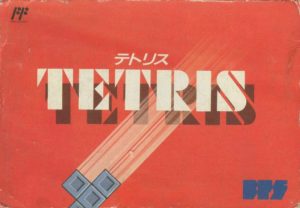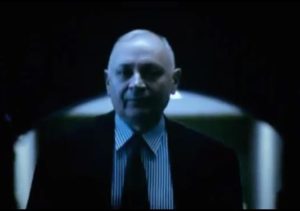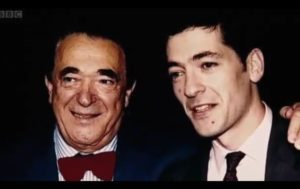Just a few weeks after the Mirrorsoft and Spectrum Holobyte versions of Tetris went on sale, Robert Stein received a telex to which was attached a Russian name he had never seen before in all his negotiating efforts. One Alexander Alexinko from a previously unheard-of state agency called Electronorgtechnica — more colloquially referred to as simply ELORG — was taking over the negotiations, which were now expected to proceed on a more formal basis. Any hopes Stein might have harbored that the Russians would just go away quietly, allowing him to reap all of the profits from Tetris coming back to Andromeda Software, were thus dashed. On the other hand, though, the very fact that the Russians were reaching out to him — just about the first proactive step he had ever witnessed from them in the previous eighteen months or so of dialog — could be a positive sign that some sort of legitimate, mutually lucrative deal was possible after all. Anything was better than the fractured, pointless discussions they had had to date.
As happened more often in the Soviet Union than its rulers might have cared to admit, the sequence of events which had brought Alexinko into the picture had had more to do with happenstance than any orchestrated shift in strategy. ELORG lived under the Soviet Ministry of Foreign Trade, where it was charged, like several competing organizations within the labyrinthine and turf-war-plagued Soviet bureaucracy, with overseeing the import and export of technology. In the past, the agency had carved out a niche for itself under this absurdly broad umbrella as the calculator kingpin of the Eastern Bloc, exporting knockoffs of American and Japanese models that were much sought-after by scientists and engineers — even if, as was all too typical of Mirror World technology, they didn’t always work quite right. But now, Perestroika was in the air, and organizations like ELORG were expected to take an entrepreneurial role in forging a new Soviet Union that was happy to trade with its former arch-enemies in the West. It was thus in search of potential products that might be viable in the West that Alexinko had come to the Moscow Computer Center one day. He was there to beat the bushes and see if any golden nuggets fell out. Games were about the farthest thing from his mind; he was interested in serious software, as befit the very serious government institution he worked for.
Then one day a personable member of the research staff named Alexey Pajitnov mentioned in casual conversation that he and, more recently and thus more pertinently, much of the management of the Computer Center had been negotiating directly with someone in Britain named Robert Stein over a game Pajitnov had created. Alexinko was shocked. A new era may have been dawning in the Soviet Union, but the old way of doing things died hard with a hardened bureaucratic veteran like him. To his mind, this unauthorized negotiation bordered on the scandalous or even treasonous. And when the researchers produced the paper trail of their confused communications with Stein, full of broad statements ripe for misconstrual, his shock turned into horror. Just as Pajitnov had been shoved out of the dialog and out of pocketing any potential profits from Tetris by his managers at the Computer Center some months before, now those selfsame managers were taken off the case by Alexinko. He would manage the discussions from here, he told them. His first step took the form of that initial telex to Stein.
It’s not clear whether Alexinko, isolated as he still was in so many ways in the Soviet Union even in the time of glasnost and perestroika, was ever aware that Stein had jumped the gun and allowed Mirrorsoft and Spectrum Holobyte to release Tetris without a clear agreement with the Russians. It is clear, however, that Stein at the very least made it plain to Alexinko that the game was well on its way to being released. In doing so, he turned what could have been a disadvantage into its opposite. This was exactly the sort of deal that the new Soviet Union was supposed to be making, exactly the sort that Alexinko was supposed to be brokering. Did he want to enjoy the credit for it, or did he want to put the brakes on it, prompting anger in at least two other countries that could very easily get back to his bosses? Stein could be very savvy at times, and this is a fine example of one of them.
Dealing at last with a motivated individual with the wherewithal to make things happen, Stein hammered out a deal with his opposite number with head-snapping speed, in marked contrast to all those previous months of fruitless back-and-forth. He visited Moscow again to put the finishing touches on the contract in February; he and Alexinko shook hands over a final draft on February 24, 1988. Alexinko explained that he just needed to get the contract approved by his superiors, then he would send it on to Stein for his signature. The Soviet bureaucracy still being the Soviet bureaucracy, it took a little longer than he had implied it would, but the deal was finally signed on May 10, 1988. Stein breathed a sign of relief, thinking he had gotten away with one. He had his contract in hand, everything was now legal and above-board, and Mirrorsoft and Spectrum Holobyte needed never know that their permission to release Tetris post-dated their actual release of Tetris by some months. Alas, though, whatever good feelings were in the air weren’t destined to stay around for long.
The first inkling of trouble came when the Mirrorsoft and Spectrum Holobyte versions of Tetris, filled with Westerners’ ideas of iconic Soviet imagery, finally made their way to Moscow. Alexinko was not at all amused by the tribute to Mathias Rust landing his private plane on Red Square, which appeared on the title screen before the game proper had even begun. What the Western media had reported as little more than an amusing human-interest story, the Soviet Union regarded as a national embarrassment. Rust had, after all, penetrated through the entire Soviet air-defense system to the very nerve center of the country flying nothing more advanced than a rickety old Cessna; Rust himself was still imprisoned in the Soviet Union, charged with terrorism. Pajitnov, for his part, took the Rust tribute in good humor, but was unhappy about portrayals of the Red Army in battle. He told Stein that he wanted Tetris to be “a peaceful game heralding a new era in the relationship between superpowers and their attitude toward world peace.” Stein dutifully took up the delicate task of requesting these omissions of Mirrorsoft and Spectrum Holobyte, who duly ponied up for some new graphics to replace the objectionable ones.
But tensions between Stein and the Russians were continuing to grow. Alexinko was coming more and more to distrust his opposite number. Royalties for Tetris were supposed to be flowing to the Russians through Stein, their only direct contact in the West. Yet by the end of September they still hadn’t seen any money at all, even as Tetris topped many computer-game bestseller charts in the United States. Stein tried to soothe an impatient and suspicious Alexinko by explaining that these things took time, that the money would be coming eventually. Alexinko didn’t believe his excuses, started mumbling about modifying the contract to include a firm time frame on royalty payments, with penalties for late payments. It’s not clear today whether Stein really was still playing fast and loose with the Russians, or whether he was, as he himself claimed, at the mercy of Mirrorsoft and Spectrum Holobyte, waiting for his own royalties to filter through those companies’ accounting departments so he could send the Russians’ cut onward. What is clear, however, is that this pugnacious little Hungarian was once again rubbing everyone in Moscow the wrong way, raising hackles and raising suspicions.
And he was still overreaching himself in trying to keep the various Western interests placated. He licensed the arcade rights to Tetris to Atari Games in May, despite never having obtained those rights from the Russians. Putting the cart before the horse yet again, only after making that deal with Atari did he broach the subject of the arcade rights with Alexinko in Moscow, hoping to quickly get a deal that would once again keep his Western partners from realizing what a dangerous game he was playing. But Alexinko obstinately refused to even talk about the issue until he started seeing royalties from the computer-game versions — not even when Stein offered a $30,000 advance for the arcade rights in July. Soon Tetris arcade machines, made by Atari Games in the United States and sub-licensed by them to Sega in Japan, were pouring out of factories, without any form of agreement with the Russians, while Stein sweated it out and hoped the Russians’ isolation would keep them from noticing.
By the time it went into production, the arcade version of Tetris had already played a critical role whose importance wouldn’t become clear for many months. Atari took a prototype of it with them to an American arcade-industry trade show in June of 1988. There it was spotted by the two most important architects of Nintendo’s stunning American success: Minoru Arakawa, the president of Nintendo of America, and his right-hand man Howard Lincoln, who bore the official titles of Senior Vice President and General Counsel but in reality was all that plus much, much more. Neither had seen or heard about Tetris before encountering it that day in Atari’s trade-show booth. Both were immediately smitten by the Tetris Effect. Randy Broweleit of Atari’s Tengen subsidiary, who had a license to release five games per year on the Nintendo Entertainment System, was in the booth as well, and proved very forthcoming. He told Arakawa and Lincoln of the game’s unlikely origins in the Mirror World, and told how Atari had been able to acquire both console rights and arcade rights to the game from Mirrorsoft in Britain. Tengen’s Nintendo version for the North American market, he explained, would likely be coming out in May of 1989. In the meanwhile, a fellow called Henk Rogers had sub-licensed the Japanese Nintendo rights from Atari and would probably be releasing his version much sooner. Arakawa and Lincoln went away satisfied that Tetris, which they both recognized to be a natural fit on the Nintendo, would eventually be appearing for the console in both Japan and North America. Fair enough, then; on to other business. But then, several months later, the conversation with Broweleit and the demonstration of Tetris flashed back into the forefront of their minds in response to a new communication from Japan.
Deep in the bowels of Nintendo’s worldwide headquarters back in Kyoto, a team of 46 designers, programmers, and engineers were hard at work putting the finishing touches on a top-secret project with revolutionary potential: a handheld game console to be called the Game Boy. It would be a sharply limited device even in comparison to the less-than-technically-earth-shattering NES, with a tiny black-and-white 2.5-inch display that smacked more of a calculator than a conventional videogame. Clearly it wasn’t going to be possible to port Super Mario Bros. to the new gadget and call it a day. Therefore the call had gone out through Nintendo’s management ranks to keep eyes open for concepts which would work well on the Game Boy. This inevitably meant simple games, far simpler even than was the norm on the NES.
Tetris was perfect for the platform. It was as if Tetris had been made with the Game Boy in mind from the start — or as if the Game Boy had been made just to play Tetris. In this light, what Randy Broweleit hadn’t said to Arakawa and Lincoln on that day at the trade show was as important as anything he had said: he’d made no mention of handheld rights. Why should he? There wasn’t any market to speak of for handheld videogames at the time. If Nintendo had their way, however, that was all about to change.
Having heard from Broweleit that Henk Rogers in Japan had sub-licensed from Atari the rights to a Famicom version of Tetris, Arakawa and Lincoln decided he was the place to start in trying to secure the handheld rights. While Rogers’s Bullet-Proof Software was undoubtedly a tiny player even by the standards of the domestic Japanese market, much less the world videogame stage, he had bonded with Nintendo’s president Hiroshi Yamauchi — by no means an easy thing to do — over their mutual love of Go, and had acquired a reputation within Nintendo as an up-and-comer with potential. Rogers, who was close enough to Nintendo’s inner circle to be in on the Game Boy secret, was told that if he could get the handheld rights for himself then Nintendo would happily sub-license them from him. It didn’t take a savvy videogame veteran like Rogers long to recognize the synergy between the Game Boy and Tetris, and to recognize that millions and millions of dollars were potentially in such a deal for him. “If you’ve met Rogers, you know that he is capable of finding his way in the middle of any storm,” says Lincoln. “Telling him that we were ready to license from him was like showing red meat to a hungry lion.” Rogers reached out to Robert Stein on November 15, 1988, saying he’d like to discuss buying the worldwide handheld rights to Tetris. As a starting point for negotiations, he offered an advance of $25,000.
Life by that point hadn’t gotten any easier for an increasingly addled Stein. In October, he had gotten word from Moscow that Alexander Alexinko had been taken off his case, to be replaced by one Nikolai Belikov. The change would not be to his benefit. If Alexinko had been a fairly typical example of the competent Soviet bureaucrat, Belikov was something else entirely, a man who had built a reputation for himself well before the era of perestroika as the consummate bureaucratic in-fighter, a master of the art of the well-timed back stab whom you trifled with at your peril. He was the sort of man who was put on the job to do an agency’s dirty work.
The conversation was soon verging on the openly hostile, as Stein and Belikov nurtured what had been from the first a pronounced dislike of one another. The fundamental impasse remained the same: Stein still hadn’t paid the Russians for the computer-game versions of Tetris that had been sold to date. “When I read [the contract with Stein], I felt very unhappy,” says Belikov. “It said the first payment should be made within three months. It was already October. I began to think what to do: how to force Andromeda Software to pay.” Yet even as he failed to pay the Russians Stein continued to pressure them to sign over arcade rights — and now, in the wake of Henk Rogers’s recent request, handheld rights. Understandably, Belikov wanted to see money from the deal that had already been signed before he signed another. “Andromeda Software sent me telexes asking to start negotiations for new licensing agreements,” says Belikov, “but my only reaction to these was ‘first honor the original agreement, then we can negotiate further.'”
Again, the reasons for Stein’s recalcitrance on this most critical of issues remain unclear. Had he really not yet been paid by Mirrorsoft and Spectrum Holobyte? Had he used the money for something else, perhaps to shore up his declining business, and thus no longer had it to give to the Russians? Or was he for some other reason simply refusing to part with it? He had happily accepted Henk Rogers’s $25,000, but continued to dither on producing the rights Rogers was after. The latter first grew impatient, then deeply suspicious. Something was wrong here. “He said he was going to go to Russia,” says Rogers. “He kept on saying that, but he wasn’t going.” With the Game Boy scheduled to ship in Japan in April of 1989, in North America in July, time was running dangerously short. At last, Rogers decided that if Stein wouldn’t go to Moscow for him, he would go himself. He would try to talk to these mysterious partners of Stein’s and see if he could negotiate a handheld deal for himself. In February of 1989, despite having no advance invitation or for that matter any official status whatsoever with ELORG, he bought a ticket for Moscow.
Rogers and Belikov weren’t the only ones sensing that Robert Stein wasn’t playing it straight. Mirrorsoft too had been inquiring about the handheld rights, perhaps envisioning a standalone handheld Tetris game, and had run into a similar pattern of delay and obfuscation, raising with them as well the question of what sort of relationship Stein really had with the Russians. The situation led Jim Mackonochie of Mirrorsoft to reach the same decision as Rogers: he would go to Moscow himself to see what was what. When he explained his plan at the next Mirrorsoft board meeting, however, he was overruled. Board member Kevin Maxwell, son of primary Mirrorsoft shareholder Robert Maxwell and thus not a man to be disputed, said he was going to Moscow for business anyway that February. He would meet with the ELORG people while he was there, he said in his confident way, and get everything sorted out.
In the United States, Phil Adam of Spectrum Holobyte had also decided to travel to Moscow himself, but was similarly shut down when he told the people back in London about his plans. Kevin Maxwell would take care of everything, he was assured.
The Chinese wall Stein had built between his partners in the West and his charges in Moscow was about to crumble. Yet Stein himself had hardly dropped out of the picture. While Rogers and Maxwell were making their plans, he finally arranged for his own trip to Moscow to try one more time to make his own deal for the arcade and handheld Tetris rights. All three parties would arrive within days of one another, none having any idea that the others were coming.
The first to arrive was Henk Rogers, primed to deploy the charm that had served him so well through his career to date. Rogers:
I did know I was going behind the Iron Curtain for the first time and I had no idea what I was getting into. I kind of knew how to deal with people who were not from my original culture. So, I was expecting to get off that plane and make friends. That’s not what happened. Everybody that I met was unfriendly and unhappy and grumpy. There was an information desk in the hotel. I asked them about ELORG. “Nope, I can’t find it.” No attempt at going any further.
The prevailing impression he had of Moscow can be summed up in the word “gray”: gray skies, gray streets, gray and unsmiling people. The television in his hotel room showed only gray snow, the radio played only gray static. Born marketer that he was, he was disturbed perhaps most of all by the complete lack of advertisements in the city: “Nobody was trying to sell you anything!” At last, he found a tour guide and translator who took him to the ELORG offices. In very un-Soviet fashion, he simply marched up unannounced and knocked on the front door.
Rogers in his Western naivete didn’t realize it, but he was actually putting his would-be negotiating partners in a very delicate position by doing so. Glasnost or no, the law still required that any meetings of Soviet citizens with foreigners be approved in advance by the state. Rogers himself was in the Soviet Union on a tourist visa, meaning that even discussing business on the trip was technically illegal.
As we’ve noted, though, Nikolai Belikov wasn’t your typical hidebound Soviet bureaucrat. He had meetings already scheduled in about a week with Robert Stein and this new, unknown quantity named Kevin Maxwell. He realized, as any savvy negotiator would, that a third party to play against the other two could be a very good thing to have. He talked briefly with Rogers that day, just long enough to tell him to come back the next day, by which time he could pull some strings to get an official meeting on the books. As a matter of courtesy, he also invited the original instigator all this chaos, Alexey Pajitnov, to attend what would turn into a solid week of negotiations.
When the next day came, Rogers found himself seated before a massive table much like the one that had greeted Robert Stein the first time he came to Moscow, inside a similarly forbidding room. Not allowing his stark surroundings to intimidate him, he launched into the sales pitch of his life. With most potential licensers, his cause would have been helped enormously by his being able to say that he enjoyed a close connection to Nintendo, by far the richest and most powerful entity in videogames, with 70 percent of the worldwide market at their command. He now realized to his shock, though, that Belikov and the rest of the Russians knew nothing about Nintendo or their enormous market clout. So, he took on the persona of a sort of consultant. He avoided the hard sell, treating the Russians more like confidants than potential marks, walking them patiently through the details of the Western videogame business in the way that Stein had never bothered to do, telling them in the process about this top-secret upcoming gadget called the Game Boy. Tetris, he said, would be the perfect game to sell millions of Game Boys — and Game Boy would be the perfect platform to sell millions of copies of Tetris. While it would perhaps be an exaggeration to say that Belikov took a liking to Rogers — he really wasn’t the sort of person to like anybody sitting on the other side of the table from him — he was favorably impressed by the contrast with Stein. When the day was over, Belikov told Rogers to come back again the next day, this time with a formal offer for the handheld rights to Tetris.
Over the course of the meeting, Rogers had forged another relationship that would prove even more key to his future than the bridge he was building to the taciturn Belikov. Even before they were introduced, he had picked out Alexey Pajitnov; he was just so intrinsically different from the other unsmiling, gray-suited (of course!) bureaucrats sitting around the table. Rogers chatted with Pajitnov, something Stein had bothered to do in only the most patronizing of terms. “Finally out of all this dressed-in-suit business world, I saw a guy who really liked and understood the game,” says Pajitnov. “And somehow we liked each other, almost immediately.” Rogers calls Pajitnov “the friend I was looking for in Russia. We got together that night, started talking about game design, immediately jumped into [ideas for] Tetris II. We had stuff to talk about.” Bonding over vodka inside the Pajitnov family’s humble apartment, finding ways to communicate despite Pajitnov’s broken English and Rogers’s nonexistent Russian, the two formed a bond of friendship and trust that has endured to the present day. For Pajitnov, the key aspect of the evening was that Rogers “offered me nothing and asked for nothing” in relation to his game. Again, the contrast with Stein couldn’t have been more pronounced.
When a woozy Rogers stumbled home to his cold hotel room that night, he knew he had seen a side of Russian culture almost impenetrable to most Westerners — the warmer side that existed behind the closed doors of family life, the one that had nothing to do with politics and ideology. And he knew that, whatever else the next day might bring, he at least had Pajitnov in his corner. The problem, of course, was that Pajitnov had long since been forced to relinquish virtually all say in the fate of his own game.
Still, Rogers’s charm and his straightforward, very un-Stein-like manner were beginning to have their effect even on Belikov. Without much preamble on the next morning, Rogers and ELORG agreed to work on a deal giving Bullet-Proof Software exclusive worldwide handheld rights to Tetris. Stein’s Chinese wall had just crumbled to dust. After a few days of detail-ironing, on February 21, 1989, they signed the final contract. For Henk Rogers, it was the deal of a lifetime, one that was all but guaranteed to make him a very, very rich man. But his euphoria was short-lived.

A boxed copy of the Bullet-Proof version of Tetris, like the one that Henk Rogers showed Nikolai Belikov at a pivotal moment.
Wishing to show his new Russian friends and business partners an actual, tangible product his company had already created using the Tetris intellectual property, Rogers reached into his bag and pulled out Bullet-Proof Software’s Nintendo Famicom version of the game, which had been released in Japan the previous month and had already sold 130,000 copies. “We’re the biggest publisher of Tetris in the world right now,” he said proudly. But Rogers needed only take one look at Belikov’s face to realize he had made a serious error. He had simply assumed that, whatever else was going on with Robert Stein, his own Famicom version of Tetris, for which he had acquired the rights from Atari rather than directly from Stein, was entirely legal and above-board. But the Russians, it gradually became clear, had no idea that any commercial versions of Tetris beyond the Mirrorsoft and Spectrum Holobyte computer games existed. Belikov, from being on the verge of smiling five minutes before — a smile represented a veritable outburst of joy from him — was now loudly accusing Rogers of software piracy. “You are illegally selling something that doesn’t belong to you,” he almost shouted, pounding the table to emphasize his point. The conversation began to take on the tone of an interrogation.
The prospect of Mirrorsoft sub-licensing part of their rights had apparently never occurred to the Russians, and had conveniently gone unmentioned by Stein. A flustered Rogers struggled to explain; flustering Henk Rogers wasn’t an easy thing to do, but Belikov had managed it. He took the Russians through the fine print on the back of the box, through Andromeda and Mirrorsoft and Atari and finally to Bullet-Proof. It was all nonsense, Belikov insisted. As far as he had understood it, the rights shouldn’t go further than Mirrorsoft and Spectrum Holobyte. Rogers asked about the videotape of the Famicom Tetris which he had been required to submit for approval, the one that Stein had told him had indeed been approved by the Russians. No one at the table had ever seen any such thing. Rogers mentioned that Stein had also licensed Tetris arcade games that were now in service all over the world. Once again, the Russians knew nothing about that.
This marked a pivotal moment — perhaps the pivotal moment in the entire negotiation. For the Russians, it provided the first incontrovertible evidence of what they had suspected all along: that Stein wasn’t an honest broker. For Rogers, it threw all of his assumptions into doubt — and suddenly threw everything, namely all of the various rights to Tetris, into play. It seemed that much of what Stein had told his Western and Eastern partners alike was, as Rogers would later put it, a “sham.” As the conversation/interrogation continued, it became clear that the Russians believed they had licensed only the computer-game rights, not console rights, to Stein. Belikov produced the contract they had signed. Whether by intention or accident, its wording on the subject was vague: it granted Stein the rights for “the IBM PC and other computer systems.” It was unclear whether “computer systems” should include game consoles. On its face, the lack of clarification was far from inexplicable: the Russians at the time had had very little idea if any what game consoles were, and even Stein had spent his career immersed in the European market, where home computers dominated in digital entertainment and consoles were almost unheard of. It struck Rogers as clear that the intent of the Russians — and most likely of Stein as well at the time of the signing — had been to limit the license to personal computers. Still, when he had seen the opportunity to make more money licensing Tetris for consoles, Stein had opted for a broad interpretation of the clause. It was difficult to say which way it would go in a court of law. And as went living-room game consoles, so potentially went handheld devices. Was a Game Boy really any less or more a “computer system” than a Famicom? Or, to really a stretch a point, could even a standup arcade game be construed as a “computer system?” It was all so damnably unclear.
Looking for a way to demonstrate his good faith, Rogers did some hasty calculations, reached again into his bag to pull out a checkbook, and wrote ELORG a check for the $40,000 he estimated he owed to Atari for the copies of Tetris he’d already sold under the terms of the contract he’d signed with them. He could sort that out with them later. Right now, he knew, much more than $40,000 was at stake. Voluntarily handing over a check was just about the last thing anyone sitting around the table could ever imagine Robert Stein doing. It made a huge impression on the Russians, not least Belikov. “Forgive me,” Belikov remembers Rogers saying. “I didn’t know. I want to work with you.”
Rogers understood that the great danger presented by the contract’s vagueness brought with it great opportunity. Everything truly was now in play. And Belikov had something of the same feeling. The next morning, he asked Rogers whether he and/or his friends at Nintendo would be interested in submitting a bid for the worldwide console rights to Tetris. Absolutely, Rogers replied, but warned that “there will be trouble.” The contract between Stein and ELORG was vague enough that Stein could make a plausible case for his interpretation, and the likes of Mirrorsoft and Atari who stood behind Stein had plenty of legal resources at their disposal. But Belikov was already hatching a scheme to clarify the situation. Implying as much to Rogers, he told him to go home, talk to Nintendo if he needed to, and prepare a proposal within three weeks.
Rogers had now been in Moscow for about a week. Stein was to come in for his scheduled meeting that very afternoon, and Belikov wanted to make sure that he didn’t get a whiff of Rogers’s presence. Really, he told Rogers in no uncertain terms, I need you to leave now. “I didn’t [yet] understand who was working for whom,” says Belikov. “But I did understand that they must not meet.”
Stein had already arrived at ELORG as Belikov hustled Rogers out the door; he had been taken to wait in a side room to ensure that Rogers wouldn’t meet him on his way out. Belikov, that master of the bureaucratic double-cross, was about to paint his masterpiece.
Assuming his most peremptory posture, he dropped a document on the table in front of Stein, demanding that he sign it before anything else was discussed. When Stein asked what it was, Belikov explained that it was an amended version of the contract that had been signed between Andromeda and ELORG back in May of 1988. The amendments were to be, by the mutual agreement of the signing parties, treated as having gone into effect with the original contract, treated for legal purposes as if they had always been there. Belikov strongly implied that the amendments applied entirely to what had been the primary source of rancor between Stein and the Russians for months now, the issue of timely payment — or, rather, the lack thereof on Stein’s part. The Russians’ determination to resolve this issue struck Stein as, if hardly welcome, not unexpected in light of everything that had transpired. Indeed, Alexander Alexinko had been threatening to add language to the contract on exactly this subject for months before Belikov had arrived on the scene. Belikov was counting on this sense of plausibility. “I artificially increased the penalties for delayed payment,” he says. “I knew that they were unrealistic, but I had to concentrate his attention on these figures, which I was naturally ready to reduce.”
Stein took the amended contract back to his hotel room that night to read it over. As expected, he returned to ELORG the next morning in a huff, insisting that the proposed payment schedules and penalties were impossibly stringent. Belikov grumbled and duly agreed to a compromise figure, whereupon Stein signed his name to the new document.
The squabbles about payments had all been an elaborate smokescreen. The real point of the amended contract was a clause which Stein had, as Belikov had intended, entirely overlooked. It clarified “computer systems” as meaning “PC computers which consist of a processor, monitor, disk drive(s), keyboard, and operation system.” In signing the contract, Stein had just retroactively voided the deal which had given the console rights to Tetris to Atari (and, yes, passed those same rights further to Henk Rogers in Japan). And in the process, he’d cut himself out of the staggering amounts of money Tetris would soon be generating on consoles and handheld devices. An embittered Stein would later call Belikov “a son of a bitch”: “They made it so matter-of-fact — we would like you [to sign this] for the sake of bureaucracy — and I agreed because I was so focused on getting what I wanted I forgot about watching what they wanted.”
The things that Stein wanted were the handheld rights, which unbeknownst to him Belikov had already signed away to Henk Rogers, and the arcade rights. Belikov rebuffed him in his usual non-committal fashion when it came to the former, telling him they’d talk about them later, but showed him a little mercy when it came to the latter. The arcade rights wouldn’t, however, come cheap: Belikov demanded a $150,000 advance, plus payment of all of Stein’s outstanding obligations for the computer-game versions of Tetris, with the late-payment penalties described in the amended contract, and all within six weeks. Still having no idea what he had done in signing the amended contract, Stein agreed to all this as well on the morning of February 24. He was then hastily bundled out of ELORG’s offices, thinking the Russians had driven hard bargains but that his trip had been at least a partial success in spite of it all.
Belikov needed to get rid of him, given that Kevin Maxwell was scheduled to arrive that very afternoon. He still had one more double-cross to pull.
Manifesting all of his father’s arrogance and authoritarianism without the same native business acumen, Kevin Maxwell was regarded as a troublesome dilettante within the Maxwell empire, with a tendency to meddle in affairs about which he had an imperfect understanding at best. It was all too typical of him to parachute down on a problem that was on the verge of being solved and take charge at the last minute, thereby to walk away with the credit from his father, whom he worshiped with a perhaps unhealthy ardor. Thus this meeting with ELORG. Maxwell seemed to expect that his name alone — his father was personally acquainted with Mikhail Gorbachev, and had been among the first Western financiers to invest in Gorbachev’s rapidly changing Soviet Union — would bring these Russian rubes into line. He walked into ELORG’s offices that afternoon oozing self-importance and condescension, but with very little idea of the particulars that he was supposed to be negotiating. The wizened old fox Belikov practically licked his lips at the sight of him.
Belikov threw the Bullet-Proof version of Tetris which Henk Rogers had left behind onto the table. “What’s this?” he asked. Maxwell said he had no idea, said it must be an unauthorized pirate version of the game. When Belikov showed him the fine print on the box, tracing the rights through Mirrorsoft to Atari and so on to Bullet-Proof, Maxwell stuck to his guns. Mirrorsoft hadn’t authorized any such release, he insisted more stridently than ever, having never bothered to research all of the side deals that had been made involving Tetris by that point. Ironically, this “pirated” version of Tetris was the only one for which the Russians had actually been paid what they were owed, thanks to the check Rogers had written a couple of days earlier. That irony wasn’t lost on Belikov. If the rights wound up disputed in court, he now had Maxwell on record admitting that a console version of Tetris which Mirrorsoft had in fact authorized — by extension anyway, through the deal with Atari — was illegitimate. It would add weight to the Russians’ claim that the console rights had never been Stein’s to license to Mirrorsoft in the first place.
But Belikov didn’t let on at this meeting that any disputes surrounded the deal the Russians had signed with Stein; better to let Maxwell find out about that later. On the subject of the handheld rights that were Maxwell’s primary goal, he proposed a quid pro quo: he would promise Mirrorsoft the opportunity to bid on the handheld rights as soon as they became available in exchange for the right to reprint a number of Maxwell Communications reference publications, such as Collier’s Encyclopedia, royalty-free in the Soviet Union. He made it sound like “waiting for the handheld rights to become available” referred to some irksome bureaucratic process that had to be finalized. In reality, of course, Mirrorsoft would be waiting a very long time, approximately forever in fact: those rights had already been purchased by Henk Rogers, and would never, ever be relinquished by him.
Belikov also promised Maxwell the right to bid for the console rights, offering to sign an agreement to that effect. Maxwell, either out of confusion or out of total ignorance of what rights Mirrorsoft already claimed to own, readily agreed. Since signing an agreement to negotiate on a set of rights carried the natural implication that one didn’t already possess said rights, Belikov now had Maxwell further on record as tacitly acknowledging that the console rights did not and had never belonged to Mirrorsoft.
A self-satisfied Kevin Maxwell walked out of ELORG on the same day he had first arrived like Neville Chamberlain leaving Munich, having signed away a whole pile of publication rights and tacitly admitted that Mirrorsoft’s contract to publish Tetris applied only to computer games — and all in return for a promise from the Russians to listen to future proposals.
Belikov, on the other hand, had more than earned the right to smile, having in the course of one rather extraordinary fortnight completely reshaped the state of Tetris as a commercial entity. He finally had Stein firmly on the hook to pay ELORG the royalties he owed, with penalties. He had licensed the arcade rights to Stein for a lucrative advance. He had tricked both Stein and Maxwell into acknowledging that their rights didn’t cover console versions, and he was awaiting new bids for those rights from Rogers and Maxwell that should be on his desk within a few weeks. He had licensed the handheld rights to Rogers on very good terms — a deal that, if Rogers’s optimism had any grounding at all in reality, could be by far the most profitable of all. He had even gotten paid by Rogers for the sales to date of the Japanese Famicom version Stein had apparently tried to slip past him, and had a promise from Rogers to continue to pay him for it while everything else got sorted out. No, it wasn’t a bad fortnight’s work at all.
Still, it wouldn’t be all smooth sailing from here. Powerful organizations had a vested interest in the previous status quo, and were hardly likely to take this sweeping realignment with equanimity. Alexey Pajitnov’s simple little game of falling shapes would cause much more international drama before all was said and done.
(Sources: the books Game Over: How Nintendo Conquered the World by David Sheff and The Tetris Effect: The Game That Hypnotized the World by Dan Ackerman; the BBC television documentary From Russia with Love. Most of the images in this article are borrowed from From Russia with Love.)















